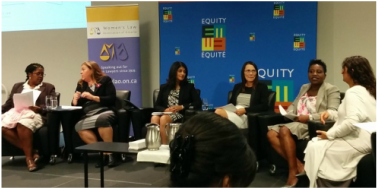 Last month I attended the program “Through the Door and at the Table: Women and Racial Diversity”, part of the Equity Education Series hosted by the Law Society of Upper Canada and the Women’s Law Association of Ontario. This free public event was advertised as a “panel discussion featuring diverse women in a variety of legal careers, including private practice, government, in-house and the judiciary. The panel discussion will touch on issues of gender, race, diversity and inclusion and speak to the ideas of access and power in the legal profession”. How could you not want to go? The event was well attended and had several impressive speakers:
Just a few of the interesting insights provided by the panelists are summarized below:
Overall it was an informative evening, followed by a great cocktail hour where you could “network” or “connect” with others. I found the panelists differing views on networking to be interesting. I do believe that “networking” or “connecting” with others is such an important concept for career advancement. As highlighted by the panel, networking is not just about getting new business in the door. It helps you find that new career position (like Marsha), it helps you get elected as Bencher with the LSUC (like Isfahan), it helps you get appointed to the bench (like Justice Bacchus), etc. If you are interested in learning more about networking and connecting with others in our profession, and how woman may or may not do it differently, please note that the Women Lawyers Forum of the OBA will be hosting an event on December 1st on this very topic. Keep an eye out for an advertisement of the event and more details, which will be announced soon!
0 Comments
Last week I attended the OBA Women Lawyers Forum's latest event in its “Pathways to Power” series, this one was on "General and In-House Counsel". The event was also co-hosted by the Ontario chapter of the Canadian Corporate Counsel Association. This was the fourth in the WLF’s series, the previous ones being Women in Politics; Women on Board; and Women on the Bench.
The speakers were Marlene Costa of the Ontario Securities Commission; Susan Kennedy of Ornge; Linda Lam of Advanced Micro Devices; and Aliya Ramji of Figure 1. The program was entertainingly chaired by Melissa Babel of KPMG Law LLP and Jana Pauk of Dentons. Some highlights of the questions and answers at the event:
These are just a few of the great insights this panel offered. I won’t give all of their tips and tricks away; you will just have to attend the next session. Pathways to Power: Female Founders will be held in Spring 2017. [1] Shameless plug for my business here: I help lawyers and law firms with drafting these very important business development and legal content marketing pieces. Outsource your legal newsletter drafting so you can keep working on your billable work! [2] Shameless plug number two: I am also the co-founder of a legal outsourcing business. Flex Legal is a network of experienced (10+ years) freelance lawyers who assist lawyers, firms and in-house legal departments on a contract, project or freelance basis. |
Erin C. Cowling is a former freelance lawyer, entrepreneur, business and career consultant, speaker, writer and CEO and Founder of Flex Legal Network Inc., a network of freelance lawyers.
Categories
All
Archives
June 2024
|
|
(C) 2014-2024 Cowling Legal. All rights reserved.
|
Please note I am not currently practicing law.
Information on this website does not constitute legal advice and is for informational purposes only. Accessing or using this website does not create a solicitor-client relationship. See website Terms of Use/Privacy Policy. |






 RSS Feed
RSS Feed
